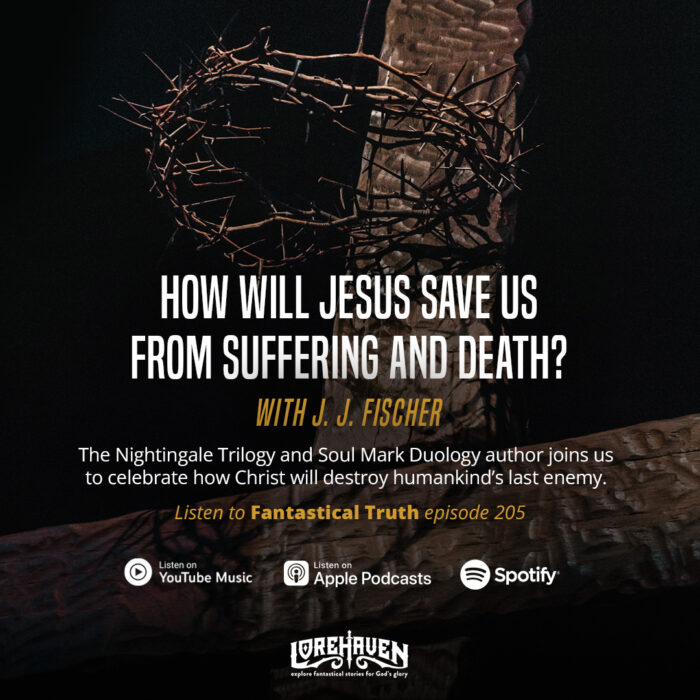205. How Will Jesus Save Us From Suffering and Death? | with J. J. Fischer
Podcast: Play in new window | Download (Duration: 1:09:50 — 65.3MB) | Embed
Sin doesn’t ruin human lives and all the creation by itself.1 Sin brings the consequence of suffering. Hebrews 2:18 promises, “For because [Jesus] himself has suffered when tempted, he is able to help those who are being tempted.” Today we’re joined by a special guest who explores real suffering, memory, and healing in the worlds of fiction: novelist J. J. Fischer.
Episode sponsors
- Oasis Family Media: “1232” dramatic podcast
- Changelings: Insurgence by Liam Corley
- Realm Makers: 2024 writers conference
Mission update
- Don’t miss How Stories Physically Reshape Our Brains For Good or Ill
- That’s by today’s guest, Jasmine Fischer, a former clinical psychologist
- Subscribe free to get updates and join the Lorehaven Guild
Concession stand
- This is part 3 of our He Saves Us series, with a specific topical focus.
- In part 1, we explored how Jesus has defeated the Devil (past tense).
- In part 2, we explored how Jesus saves us from our villain (present tense).
- Now we focus on other consequences of sin: disease, suffering, death.
- Human sin may be the “final boss” at the cross, as we said last week.
- Yet in the end, “the last enemy to be destroyed is death” (1 Cor. 15:26).
 Introducing guest J. J. (Jasmine) Fischer
Introducing guest J. J. (Jasmine) Fischer
Jasmine Fischer lives with her husband on the beautiful central coast of New South Wales, Australia, where she enjoys reading, going for long walks, and forgetting to water her plants. Originally a psychologist with a master’s degree in clinical psychology, Jasmine works as a Christian fantasy author and freelance editor. Her novel Calor won the 2023 Realm Award Book of the Year. Follow her literary adventures at JJFischer.com where you can subscribe to her newsletter or send her a message, or you can follow her on Instagram and Facebook. (Due to the rising cost of birdseed, she no longer accepts carrier pigeons.)
1. Human sin brought consequences to creation
- Genesis 1–2: God created humans to steward all creation for His glory.
- Originally we would have lived forever, without disease, death, suffering.
- Imagine perfect mental health, too; no tragedies, only satisfaction.
- Genesis 3: humans chose to rebel against God’s good created order.
- As a result, thorns and thistles oppose humans’ attempt to steward.
- “Thorns and thistles” also image the disorder and tragedy of creation.
- Some examples of these consequences in recent fiction by J. J. Fischer.
Open discussion
- Stephen likes to call creation the “third party” between God and man.
- God is not His creation. Man is not God’s creation. Creation is distinct.
- Creation strikes back not just with weeds but with storms and entropy.
- Alas, some Christians want to avoid pantheism, so they ignore creation.
- Romans 8 says, “The creation itself” groans in “bondage to decay.”
- And “we ourselves groan inwardly,” suffering from sin’s consequences.
- This doesn’t just mean our own sin, but sin’s corruption in the world.
- It leads to mental disorders, struggles to focus, anxiety, and real trauma.
2. Human doctors can relieve or even cure some ills
- Physicians had some limited success before scientific processes.
- After that, successes (and many failures) exploded in growth.
- Doctors and others could relieve or even prevent or cure many diseases.
- Lately we’ve seen more growth in fields of mental health and wellness.
- From professional to populist platforms, we’re hearing a lot about this.
- And so more therapeutic–related ideas are helping inform more stories.
- For example, in Calor, our heroes struggle with terrible past tragedies.
- Memory becomes a commodity that can be shared or suppressed.
- But human healing can only go so far, with in an advanced medical age.
- Doctors and therapists still understand very little about the human brain.
- Or many of them apply false religions or materialism to their work.
- Meanwhile, false teachers promise miraculous “healing” for today.
- As a result, people think that only one method can relieve/cure these ills.
- Any examples of extremes or unhelpful ideas in therapy, past or present?
3. Jesus Christ, the Great Physician, will heal all hurts
- It helps to know that Jesus Christ has suffered much like humans do.
- He was truly Man, so He experienced pain, wounds, and surely stresses.
- Finally, He underwent acute physical abuse/trauma/torture on the Cross.
- But lest we get lost in those past details, let us focus on the future hope.
- Rev. 21: He will “wipe away every tear,” better than any therapist could.
- This is part of what Tolkien called the eucastrophe, the good “cataclysm.”
- So if you struggle with disease or have seen death, imagine that relief!
- (Stephen had a very small-scale version of this last week at church.)
- If you face mental health or other struggles, imagine the healing!
- Until then, our stories often hint or even re-enact these happy endings.
- Heroes receive healing or the hint of healing from their sufferings.
- We can see characters who struggle with trauma pursue resolution.
- Examples of this in recent fantasy, including J. J. Fischer’s recent books.
Com station
Commenting on Episode 202, JenniferRae wrote:
I tried out this podcast today on my commute to work. This was the episode that I chose & I enjoyed listening to the banter between the cohosts. I’m not even into fiction books, but the content here was super relatable in other aspects. Too bad I had to pause it to go to work.
Top question for listeners
- How do you anticipate Jesus saving you from bad health?
Next on Fantastical Truth
Ready to spring into reading? Now that we’ve wrapped He Saves Us, for now, let’s take that wonder of real salvation into all our fantastical worlds. On this podcast, we’re planning blockbuster guests and topics for the summer and beyond. For example, this is probably next week’s episode: when your pastor, or that popular religious leader, starts warning you against popular culture and fantastical stories, what’s a Christian fan to do?
- Photo by Ismael Paramo on Unsplash. ↩































Share your thoughts about this podcast episode